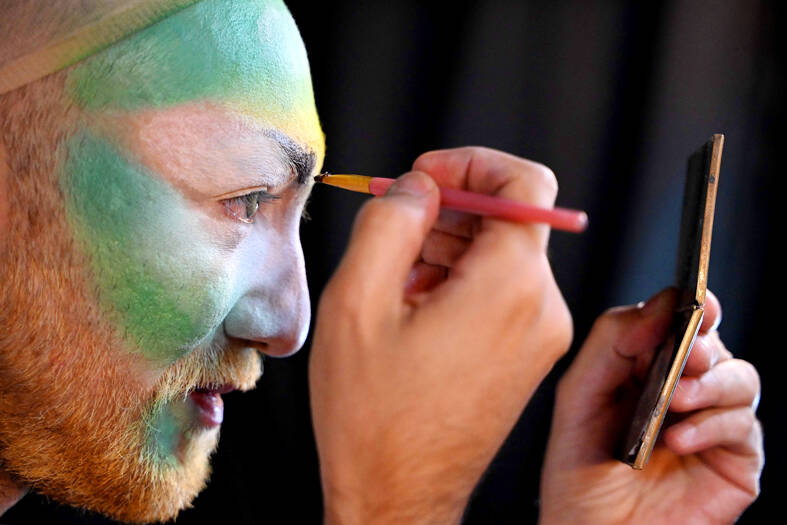When Filipino drag queen Amadeus Fernando Pagente dressed up as Jesus Christ and sang the Lord’s Prayer in a Manila show, he considered it an expression of his Catholic faith. But then a video of the performance went viral in July last year and ignited outrage among the country’s many devout, who saw it as a blasphemous act deserving of jail or even death.
Pagente was charged with the offence of “immoral doctrines, obscene publications and exhibitions and indecent shows” that “offend any race or religion,” and could face up to 12 years in jail.
The 33-year-old, who uses he, she and they pronouns, was declared persona non grata in multiple cities and was flooded with hate messages and death threats on social media.

Photo: AFP
While the Philippines has a reputation for being LGBTQ-friendly, it remains a conservative country where nearly 80 percent of people are Catholic.
Same-sex marriage, abortion and divorce are banned, and advocates have been fighting for decades for a nationwide law to protect LGBTQ people from discrimination.
Pagente, who describes himself as pansexual, gender fluid and a devout Catholic, said the reaction to his show left him shaken, but not surprised.

Photo: AFP
He said hatred towards LGBTQ people “has always been there,” but his performance gave critics “an excuse to express it.”
Pagente said he chose to perform the Lord’s Prayer to “reignite” a sense of faith among LGBTQ people who have felt shunned by the Church.
For many Filipinos, however, his portrayal of Jesus singing the religious prayer in a drag show was offensive.

Photo: AFP
Two Christian groups are among those that filed seven criminal complaints against Pagente.
RELIGION AND QUEERNESS
Harry Serrano of the LGBTQ advocacy group UP Babaylan said the backlash was about Pagente’s sexuality.
“We have seen instances where straight people imitate religious figures and they don’t get flak for it. But because PLV is queer, they are getting hate,” she said, using the initials for Pagente’s drag name, Pura Luka Vega.
“We see religion and queerness as something that’s separate in the Philippines. It’s either you’re queer or you’re religious.”
Since taking office in 2013, Pope Francis has repeatedly said the Church should be open to everyone, including LGBTQ believers.
But Francis has also made clear that he believes homosexuality is a sin, while Church doctrine states same-sex acts are “intrinsically disordered.”
Father Jerome Secillano of the Catholic Bishops’ Conference of the Philippines said the Church criticized Pagente’s performance because it was “disrespectful” of the faith.
“I have no problem with him being gay, I have no problem with whatever his queerness is,” Secillano said.
LGBTQ people are welcome in the Church, Secillano said, but “you must be willing to change for God because God will not change for you.”
DAILY DISCRIMINATION
Carlos Conde of Human Rights Watch said the Catholic Church in the Philippines was “pretty liberal” compared to other countries.
But he said if LGBTQ people felt they could not freely express themselves without fear of being harmed or threatened, “then I think we have a problem.”
Conde said laws protecting religious feelings should be reviewed to ensure they were not “harming freedom of expression.”
In recent decades, the LGBTQ community has become increasingly visible in public and on television in the Philippines.
Annual Gay Pride marches draw thousands of people, and LGBTQ groups are found across the country and on social media. But Serrano said the LGBTQ community still “faced discrimination on a daily basis.”
A survey conducted by local pollster Social Weather Stations early last year showed mixed views.
It found 79 percent of respondents agreed that “gays or lesbians are just as trustworthy as any other Filipino,” while 73 percent said they have contributed a lot to society.
But 40 percent said they would like their gay or lesbian family members to become straight and 26 percent thought being gay or lesbian was “contagious.”
Senator Risa Hontiveros, who has championed LGBTQ rights, described Pagente’s performance as “regrettable.”
Last year, she urged people not to use the incident “to deny rights and protections to a community that has long been marginalized and excluded.”
Hontiveros is sponsoring a bill that would prohibit discrimination on the basis of sexual orientation and gender identity, which progressive members of congress have been trying to get approved for more than 20 years.
It has faced stiff opposition from conservative lawmakers and religious leaders, who claim it would be a stepping stone to same-sex marriage and would infringe on the rights of the Catholic Church and schools. As he fights to stay out of jail, Pagente continues to perform in drag shows and remains defiant about dressing up as Jesus.
“You can’t tell me what I can and cannot do in terms of expressing my faith or how I express my queerness,” he said. “No one has an exclusive ownership of the concept of Jesus.”

Taiwanese chip-making giant Taiwan Semiconductor Manufacturing Co (TSMC) plans to invest a whopping US$100 billion in the US, after US President Donald Trump threatened to slap tariffs on overseas-made chips. TSMC is the world’s biggest maker of the critical technology that has become the lifeblood of the global economy. This week’s announcement takes the total amount TSMC has pledged to invest in the US to US$165 billion, which the company says is the “largest single foreign direct investment in US history.” It follows Trump’s accusations that Taiwan stole the US chip industry and his threats to impose tariffs of up to 100 percent

On a hillside overlooking Taichung are the remains of a village that never was. Half-formed houses abandoned by investors are slowly succumbing to the elements. Empty, save for the occasional explorer. Taiwan is full of these places. Factories, malls, hospitals, amusement parks, breweries, housing — all facing an unplanned but inevitable obsolescence. Urbex, short for urban exploration, is the practice of exploring and often photographing abandoned and derelict buildings. Many urban explorers choose not to disclose the locations of the sites, as a way of preserving the structures and preventing vandalism or looting. For artist and professor at NTNU and Taipei

March 10 to March 16 Although it failed to become popular, March of the Black Cats (烏貓進行曲) was the first Taiwanese record to have “pop song” printed on the label. Released in March 1929 under Eagle Records, a subsidiary of the Japanese-owned Columbia Records, the Hoklo (commonly known as Taiwanese) lyrics followed the traditional seven characters per verse of Taiwanese opera, but the instrumentation was Western, performed by Eagle’s in-house orchestra. The singer was entertainer Chiu-chan (秋蟾). In fact, a cover of a Xiamen folk song by Chiu-chan released around the same time, Plum Widow Missing Her Husband (雪梅思君), enjoyed more

From insomniacs to party-goers, doting couples, tired paramedics and Johannesburg’s golden youth, The Pantry, a petrol station doubling as a gourmet deli, has become unmissable on the nightlife scene of South Africa’s biggest city. Open 24 hours a day, the establishment which opened three years ago is a haven for revelers looking for a midnight snack to sober up after the bars and nightclubs close at 2am or 5am. “Believe me, we see it all here,” sighs a cashier. Before the curtains open on Johannesburg’s infamous party scene, the evening gets off to a gentle start. On a Friday at around 6pm,